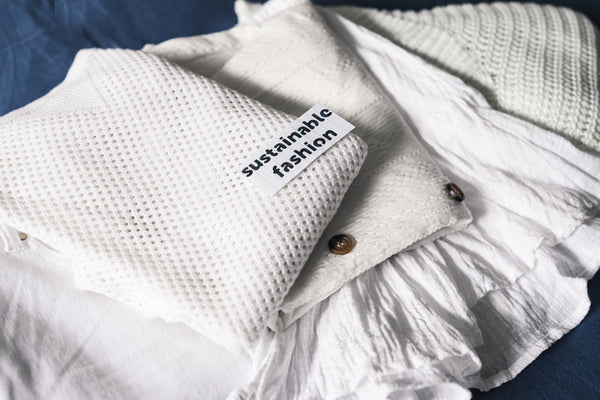As the fashion industry continues to be one of the largest contributors to environmental damage, sustainable accessories are becoming more important than ever. Sustainable accessories are items made from eco-friendly materials and produced through ethical and sustainable manufacturing processes. In this blog, we will explore why sustainable accessories are important, the environmental impact of fast fashion, the benefits of adding sustainable accessories to your wardrobe, examples of sustainable accessories, tips for shopping for sustainable accessories, and more. By the end of this blog, we hope to inspire you to make more conscious fashion choices and to consider adding sustainable accessories to your wardrobe.
Table of Contents:
The Environmental Impact of Fast Fashion
The fashion industry is the second-largest polluter in the world, second only to the oil industry. Fast fashion, which refers to the mass production of inexpensive clothing and accessories, is a major contributor to the industry's negative impact on the environment. Here are some ways in which fast fashion harms the environment:
Water Pollution: The dyeing and finishing processes used to create clothing can release toxic chemicals into waterways, contaminating the water and harming aquatic life.
Landfill Waste: Fast fashion produces a staggering amount of waste. Many of the garments produced are cheaply made and designed to be worn only a few times before being discarded. These items end up in landfills, where they can take hundreds of years to decompose.
Carbon Emissions: The production and transportation of clothing items contribute to greenhouse gas emissions, which contribute to climate change.
Fast fashion also has negative effects on people and animals. Workers in the fast fashion industry are often paid low wages and work in unsafe conditions. The use of synthetic materials and toxic chemicals in clothing production can also have harmful effects on human health. The overconsumption of clothing also contributes to a culture of disposability, where items are seen as disposable and not valued for their quality or durability.

What are Sustainable Accessories?
Sustainable accessories are items that are made from environmentally friendly materials and produced using ethical and sustainable manufacturing processes. Here are some key characteristics of sustainable accessories:
Eco-friendly Materials: Sustainable accessories are made from materials that are renewable, biodegradable, or recycled. Examples of eco-friendly materials include organic cotton, bamboo, recycled plastic, cork, and wood.
Ethical Manufacturing: Sustainable accessories are produced using ethical and sustainable manufacturing processes. This means that workers are paid fair wages, work in safe conditions, and that production practices minimize harm to the environment.
Durability: Sustainable accessories are designed to last longer than their fast fashion counterparts. This reduces waste and encourages consumers to value their possessions and use them for longer.
Some advantages of sustainable accessories include:
Environmental Benefits: Sustainable accessories are made from materials that are less harmful to the environment and produced using manufacturing processes that minimize pollution and waste.
Social Benefits: Sustainable accessories are often produced by workers who are paid fair wages and work in safe conditions.
Economic Benefits: Sustainable accessories may be more expensive upfront, but they are often of higher quality and designed to last longer. This can save consumers money in the long run by reducing the need to constantly replace items.
Overall, sustainable accessories are a great way to make more conscious fashion choices and to reduce your environmental impact. By supporting brands that prioritize sustainability and ethical manufacturing practices, you can help create a more sustainable and just fashion industry.

Examples of Sustainable Accessories
There are many different types of sustainable accessories available on the market today. Here are some examples of sustainable accessories:
Sustainable Jewelry: Sustainable jewelry is made from materials like recycled metals, responsibly sourced gemstones, and natural materials like wood or seeds. Brands like Mejuri and Catbird offer a range of eco-friendly jewelry options.
Sustainable Handbags and Purses: Sustainable handbags and purses are made from materials like recycled leather, vegan leather, or natural fibers like hemp or organic cotton. Brands like Matt Nat and Baggu offer stylish and sustainable handbag options.
Sustainable Shoes and Sneakers: Sustainable shoes and sneakers are made from materials like recycled plastic, natural rubber, and sustainable textiles like organic cotton or linen. Brands like Veja and Allbirds offer a range of sustainable footwear options.
Sustainable Hats and Scarves: Sustainable hats and scarves are made from materials like organic cotton, recycled wool, and natural fibers like alpaca or cashmere. Brands like Patagonia and Eileen Fisher offer sustainable options for winter accessories.
These are just a few examples of the sustainable accessory options available today. By choosing sustainable accessories, you can support eco-friendly and ethical manufacturing practices while still looking stylish and on-trend.

Tips for Shopping for Sustainable Accessories
When shopping for sustainable accessories, there are several tips to keep in mind to make sure you're making the most eco-friendly and ethical choices:
Research Brands and Materials: Do your research on the brands you're interested in purchasing from to make sure they prioritize sustainability and ethical manufacturing practices. Look for brands that use eco-friendly materials like organic cotton, recycled plastic, or natural fibers. You can also look for certifications like Fair Trade, GOTS (Global Organic Textile Standard), or Bluesign to ensure a brand's sustainability claims.
Shop Second-hand: Shopping second-hand is a great way to reduce your environmental impact and support a circular economy. Look for pre-loved sustainable accessories on resale websites like Poshmark or ThredUp, or shop at thrift stores and vintage shops.
Invest in High-quality Pieces: When purchasing sustainable accessories, it's important to invest in high-quality pieces that are designed to last. Look for well-made items with durable materials and timeless designs that won't go out of style.
Care for Your Accessories to Make Them Last Longer: Proper care can help extend the life of your sustainable accessories. Follow care instructions carefully, store your items properly, and repair them if needed to avoid unnecessary waste.
By following these tips, you can make more conscious and sustainable fashion choices when shopping for accessories. Remember that every small action can make a difference, and by choosing sustainable accessories, you're contributing to a more eco-friendly and ethical fashion industry.

The Impact of Consumer Choices on the Fashion Industry
Consumer choices have a significant impact on the fashion industry, as the demand for certain products and practices can shape the industry as a whole. Here are some ways in which consumer choices can impact the fashion industry:
Consumer Demand Shapes the Fashion Industry: The fashion industry is driven by consumer demand, as companies aim to create products that consumers will buy. This means that if consumers demand more sustainable and ethical practices, companies will be more likely to prioritize these practices in order to meet consumer demand.
Consumer Choices Can Drive Sustainable Practices: When consumers choose sustainable accessories and clothing, they are sending a message to the fashion industry that they value sustainable practices. This can lead to companies investing more in sustainable materials and production processes in order to meet consumer demand.
Examples of Consumer-driven Changes in the Industry: Consumer demand has already led to some changes in the fashion industry, such as the rise of sustainable fashion brands and the adoption of more eco-friendly and ethical practices by larger fashion companies. For example, HM launched its Conscious Collection in 2011 in response to consumer demand for more sustainable fashion options.
By making conscious and sustainable fashion choices, consumers have the power to drive change in the fashion industry. By supporting sustainable brands and choosing eco-friendly and ethical accessories, consumers can send a message that they value sustainability and ethical practices, encouraging companies to prioritize these practices and creating a more sustainable and just fashion industry overall.

The Role of Sustainable Accessories in Creating a More Circular Economy
The concept of a circular economy is an economic model that aims to eliminate waste and create a closed-loop system, where resources are used and reused in a sustainable way. Here's how sustainable accessories can contribute to a circular economy:
Sustainable Accessories Can Be Made from Recycled or Upcycled Materials: By using recycled or upcycled materials, sustainable accessory brands can reduce the amount of waste produced by the fashion industry and create new products out of existing resources.
Sustainable Accessories Can Be Designed for Durability and Repairability: By designing accessories to last longer and be easily repaired, sustainable accessory brands can reduce the amount of waste produced by the fashion industry and extend the life of their products.
Sustainable Accessories Can Be Resold or Recycled: When sustainable accessories reach the end of their life, they can be resold or recycled instead of being discarded, creating a closed-loop system where resources are reused instead of wasted.
A circular economy in fashion can have many benefits for the environment and society, including:
- By creating a closed-loop system, a circular economy can reduce the amount of waste produced by the fashion industry and prevent the depletion of natural resources.
- A circular economy can create new job opportunities in areas like repair, recycling, and upcycling, supporting local economies and creating new sources of employment.
- A circular economy can help to reduce the environmental impact of the fashion industry by reducing waste, greenhouse gas emissions, and water use.
By choosing sustainable accessories and supporting circular economy practices in the fashion industry, consumers can contribute to a more sustainable and just world.

Conclusion
Sustainable accessories are an important way to reduce the negative impact of the fashion industry on the environment and people. They offer environmental, social, and economic benefits, and there are many examples of sustainable accessories available on the market today, from sustainable jewelry to hats and scarves. When shopping for sustainable accessories, it's important to research brands and materials, shop second-hand, invest in high-quality pieces, and care for your accessories to make them last longer. If you're ready to shop for high-quality yet sustainable products, then explore Dresses Max and you can find thousands of amazing options.


